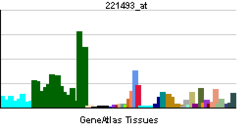TSPYL1
Testis-specific Y-encoded-like protein 1 is a protein that in humans is encoded by the TSPYL1 gene.[3][4]
References
Further reading
- Wiemann S, Weil B, Wellenreuther R, et al. (2001). "Toward a catalog of human genes and proteins: sequencing and analysis of 500 novel complete protein coding human cDNAs". Genome Res. 11 (3): 422–35. doi:10.1101/gr.GR1547R. PMC 311072
 . PMID 11230166.
. PMID 11230166.
- Simpson JC, Wellenreuther R, Poustka A, et al. (2001). "Systematic subcellular localization of novel proteins identified by large-scale cDNA sequencing". EMBO Rep. 1 (3): 287–92. doi:10.1093/embo-reports/kvd058. PMC 1083732
 . PMID 11256614.
. PMID 11256614.
- Scherl A, Couté Y, Déon C, et al. (2003). "Functional proteomic analysis of human nucleolus". Mol. Biol. Cell. 13 (11): 4100–9. doi:10.1091/mbc.E02-05-0271. PMC 133617
 . PMID 12429849.
. PMID 12429849.
- Strausberg RL, Feingold EA, Grouse LH, et al. (2003). "Generation and initial analysis of more than 15,000 full-length human and mouse cDNA sequences". Proc. Natl. Acad. Sci. U.S.A. 99 (26): 16899–903. doi:10.1073/pnas.242603899. PMC 139241
 . PMID 12477932.
. PMID 12477932.
- Ota T, Suzuki Y, Nishikawa T, et al. (2004). "Complete sequencing and characterization of 21,243 full-length human cDNAs". Nat. Genet. 36 (1): 40–5. doi:10.1038/ng1285. PMID 14702039.
- Puffenberger EG, Hu-Lince D, Parod JM, et al. (2004). "Mapping of sudden infant death with dysgenesis of the testes syndrome (SIDDT) by a SNP genome scan and identification of TSPYL loss of function". Proc. Natl. Acad. Sci. U.S.A. 101 (32): 11689–94. doi:10.1073/pnas.0401194101. PMC 511011
 . PMID 15273283.
. PMID 15273283.
- Gerhard DS, Wagner L, Feingold EA, et al. (2004). "The status, quality, and expansion of the NIH full-length cDNA project: the Mammalian Gene Collection (MGC)". Genome Res. 14 (10B): 2121–7. doi:10.1101/gr.2596504. PMC 528928
 . PMID 15489334.
. PMID 15489334.
- de Andrade TG, Peterson KR, Cunha AF, et al. (2006). "Identification of novel candidate genes for globin regulation in erythroid cells containing large deletions of the human beta-globin gene cluster". Blood Cells Mol. Dis. 37 (2): 82–90. doi:10.1016/j.bcmd.2006.07.003. PMID 16952470.

 . PMID 11230166.
. PMID 11230166. . PMID 11256614.
. PMID 11256614. . PMID 12429849.
. PMID 12429849. . PMID 12477932.
. PMID 12477932. . PMID 15273283.
. PMID 15273283. . PMID 15489334.
. PMID 15489334.